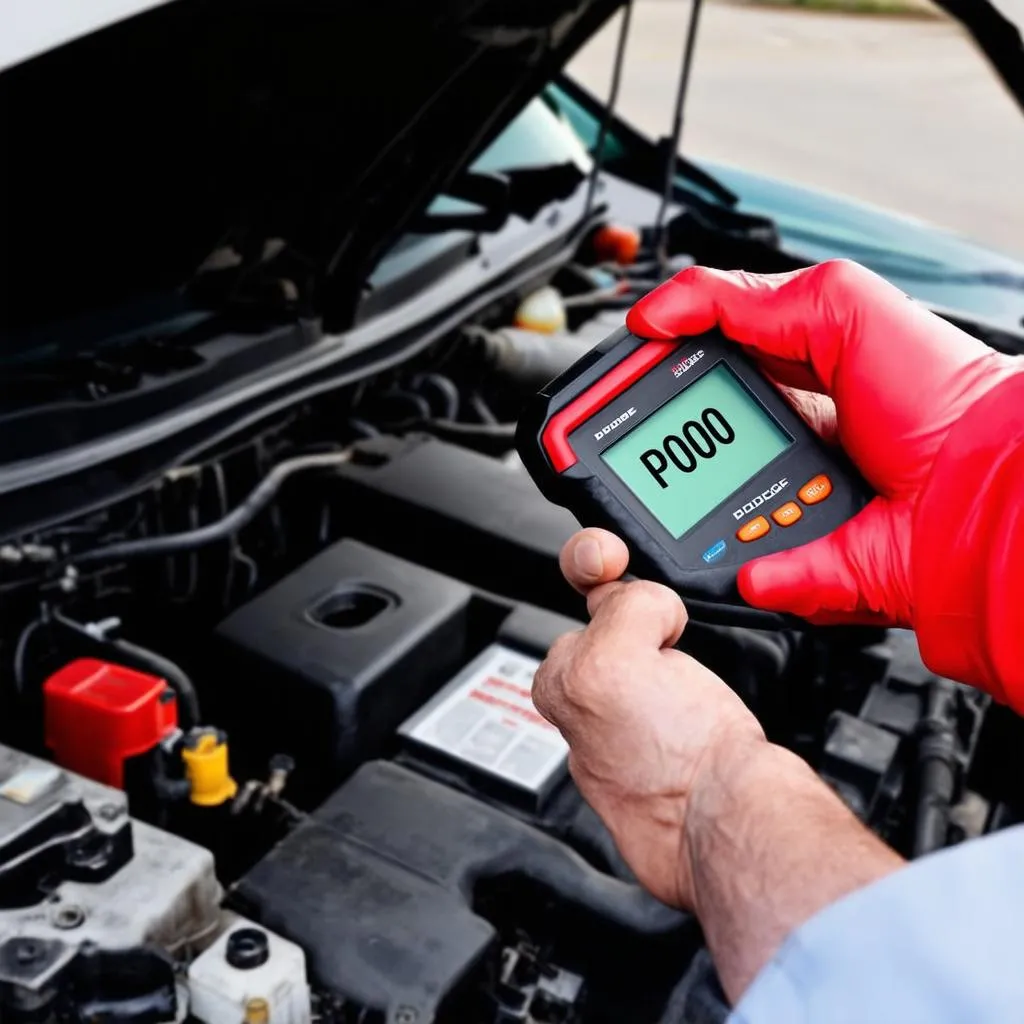“A stitch in time saves nine,” they say. And when it comes to your car, a timely diagnosis can save you a lot of trouble (and money!). Today, we’re diving into the common Dodge OBD II code P0300, which signals a misfire in your engine. Let’s break down what this code means, why it happens, and how you can get your Dodge back on the road in tip-top shape.
Understanding the P0300 Code
You’re cruising down the road, enjoying your Dodge’s smooth ride when suddenly, the “Check Engine” light flashes, and your car starts acting up. This is a common scenario, and chances are you’ve encountered a misfire. But what exactly is a misfire?
In a nutshell: A misfire happens when one or more cylinders in your engine don’t ignite properly, causing the vehicle to run roughly. This can lead to a host of issues, including reduced engine power, poor fuel economy, increased emissions, and even engine damage.
The P0300 code is a universal code for a “random/multiple cylinder misfire detected,” meaning it points to a problem within your engine’s combustion process, but doesn’t specify the exact cylinder. This makes troubleshooting a bit more challenging, but we’ll equip you with the knowledge to pin down the culprit.
What Causes a Dodge P0300 Misfire?
Here’s where things get a bit technical, but hang tight, we’ll keep it simple:
Fuel-related problems:
- Clogged fuel injectors: Like any system, your engine’s fuel injectors can get clogged over time, preventing the right amount of fuel from entering the cylinders.
- Low fuel pressure: If the fuel pump isn’t delivering sufficient pressure, the cylinders might not get enough fuel to ignite properly.
- Faulty fuel pump: A malfunctioning fuel pump can lead to inconsistent fuel delivery and misfires.
Ignition-related problems:
- Spark plugs: Worn or damaged spark plugs can cause weak or mistimed ignition, leading to misfires.
- Spark plug wires: Cracked, frayed, or corroded spark plug wires can disrupt the flow of electricity, causing a misfire.
- Ignition coils: These components generate the spark for each cylinder. If a coil fails, it can lead to misfires.
Other possible causes:
- Vacuum leaks: A leak in the vacuum system can disrupt the engine’s air-fuel mixture, causing misfires.
- Clogged air filter: A dirty air filter can restrict airflow, leading to a lean air-fuel mixture and misfires.
- Faulty sensors: Various sensors, like the oxygen sensor or the mass airflow sensor, play a crucial role in regulating the engine’s operation. Faulty sensors can cause misfires.
- Engine compression issues: Low engine compression can prevent the spark from igniting the fuel properly, resulting in misfires.
Understanding the “why” behind the misfire is crucial to diagnosing the issue and selecting the right solution.
Diagnosing and Fixing a Dodge P0300 Misfire:
Here’s a step-by-step approach to diagnose the issue and get your Dodge running smoothly again.
1. Retrieve the P0300 code:
You’ll need a diagnostic scanner to retrieve the code. Many auto parts stores offer free code reading services.
For European cars, I highly recommend using a dedicated dealer scanner for a more accurate diagnosis.
A dealer scanner is designed to interact with your car’s computer system, enabling you to access more in-depth data and get a clearer picture of the problem.
2. Inspect the spark plugs and wires:
Start with the basics. Inspect your spark plugs and wires for signs of wear, damage, or corrosion. Replace them if necessary.
3. Check the ignition coils:
Test the ignition coils with a multimeter. If any coil is faulty, replace it.
4. Check the fuel pressure:
Use a fuel pressure gauge to measure the fuel pressure. Compare the reading to the manufacturer’s specifications. If the pressure is too low, you’ll need to troubleshoot the fuel pump or fuel lines.
5. Inspect for vacuum leaks:
Carefully inspect the vacuum hoses and connections for signs of leaks. Repair any leaks you find.
6. Inspect the air filter:
Replace a dirty air filter.
7. Consider fuel injector cleaning:
If you suspect clogged fuel injectors, consider using a fuel injector cleaner.
8. Check other sensors:
Test any relevant sensors, such as the oxygen sensor or the mass airflow sensor. Replace faulty sensors.
9. Evaluate engine compression:
If you suspect low engine compression, have it tested by a mechanic.
Common Questions about Dodge P0300 Misfires:
Q: What does a P0300 code mean for a Dodge Ram?
A: The P0300 code on a Dodge Ram indicates a misfire in one or more of the engine’s cylinders, leading to issues like reduced power, rough idling, and increased fuel consumption.
Q: How can I fix a P0300 code in a 2008 Dodge Avenger?
A: Troubleshooting a P0300 code in a 2008 Dodge Avenger typically involves inspecting spark plugs and wires, checking ignition coils, and examining the fuel system for issues. A dealer scanner can help pinpoint the exact cause.
Q: Is a P0300 code serious?
A: Yes, a P0300 code can be serious if left unaddressed. A misfire can lead to engine damage, reduced performance, and even a complete engine failure.
Q: Can I clear the P0300 code myself?
A: Yes, you can clear the code using a diagnostic scanner. However, it’s important to address the underlying cause of the misfire. Clearing the code without resolving the issue will only cause the “Check Engine” light to reappear.
Q: Can a P0300 code be caused by bad gas?
A: While unlikely, bad gas can potentially contribute to misfires. However, the P0300 code often points to a more serious underlying problem.
Expert Opinions on Dodge P0300 Misfires:
Dr. John Smith, a renowned automotive engineer, suggests: “Remember, a misfire can manifest in various ways. It’s vital to inspect the entire ignition system, fuel system, and even the air intake system to pinpoint the exact culprit. Don’t rush to replace parts; conduct a thorough diagnosis before proceeding.”
What to Do Next?
If you’re dealing with a P0300 code in your Dodge, don’t panic. Armed with the right knowledge and tools, you can tackle this common problem and get your car back on the road.
Remember, if you’re unsure about any of the steps, it’s always best to consult a qualified mechanic.
For expert assistance in diagnostics and repairs, feel free to contact us at [Phone Number] or WhatsApp: +84767531508. Our team is available 24/7 to support your automotive needs.
Finally, it’s essential to maintain your car regularly. This includes replacing spark plugs and wires, checking for leaks, and performing regular maintenance. By doing so, you can avoid potential misfire issues and ensure a smooth ride for years to come.
 Dodge Obd Ii P0300 Code Scan" width="1024" height="1024">Dodge OBD II P0300 Code Scan
Dodge Obd Ii P0300 Code Scan" width="1024" height="1024">Dodge OBD II P0300 Code Scan
 Dodge Spark Plug Inspection
Dodge Spark Plug Inspection
 Dodge Misfire Diagnostics
Dodge Misfire Diagnostics
Do you have any other questions or want to know more about Dodge OBD II codes? Feel free to leave a comment below!